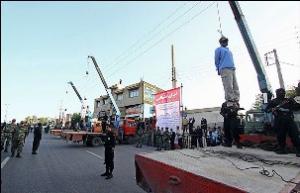DRUG WAR CHRONICLE: For years, Iran has been one of the world’s leading executioners of drug offenders, with hundreds of people hung from the gallows annually for drug smuggling and trafficking. But in a remarkable turnabout, that is no longer the case.

After the Iranian parliament amended the country’s drug laws in November 2017, drug executions have all but halted, according to a new report from Iran Human Rights (IHR). The non-profit group found that only one person had been executed for a drug offense this year in Iran, compared to 112 during the same period last year and nearly 500 for all of 2017.That’s a 99% reduction in the resort to the death penalty for drugs in the Islamic Republic.
The changes to Iran’s drug laws didn’t remove the death penalty from the books — it remains one of 33 countries, including the United States, that mete out the ultimate punishment for drug offenses — but it dramatically raised the quantities of drugs needed to merit the death penalty.
Under the old law, being caught with a little more than an ounce (30 grams) of drugs such as cocaine or heroin could bring a death sentence. Now, it takes nearly 4 ½ pounds (2 kilograms). Similarly, for plant-based drugs such as cannabis and opium, the death penalty threshold has increased ten-fold, from 5 kilograms (11 pounds) to 50 kilograms (110 pounds).
The death penalty can also be imposed for certain other drug offenses where quantity is not the issue, for example, the use of a minor in a drug trafficking operations, carrying or using firearms while committing drug-related crimes, having a prior death penalty or prison sentence longer than 15 years, or being the “leader” of a drug trafficking group.
The one man executed for drug offenses in Iran this year, identified as Kiomars Nosuhi, was convicted of being a “leader” of a drug trafficking group.
Bordering Afghanistan, the world’s primary supplier of raw opium and heroin, Iran has for decades waged war on drug smugglers, with thousands of police and soldiers killed in the struggle. While opium smoking was a traditional Iranian pastime, the country now has one of the world’s highest addiction rates, with heroin largely replacing opium. In recognition of that reality, in the past decade, Iranian officials have switched from harsh punishments of drug users to emphasizing drug treatment and harm reduction. The end of the reflexive resort to the death penalty for drugs marks another step in the country’s march toward a more progressive policy response.
While human rights groups applaud the dramatic decline in drug executions, they continue to express concern over the way the Iranian judicial system responds to drugs.
“We welcome the significant reduction in the use of the death penalty and hope that this trend will continue towards complete abolition,” said IHR spokesperson Mahmood Amiry-Moghaddam. “However, we have several serious concerns regarding the process of implementation of the new amendment, including bribery in the judicial system, insufficient capacity to handle a large number of cases, and lack of a monitoring organ overlooking the process.”
And then there are the tens of thousands of drug offenders filling Iran’s prisons. The country has more than 250,000 people behind bars, 50% to 70% for drug offenses. The Islamic Republic may not be running the gallows at full tilt anymore for drugs, but incarceration remains a key element of Iranian drug policy. Still, Iran has taken an important step forward.

